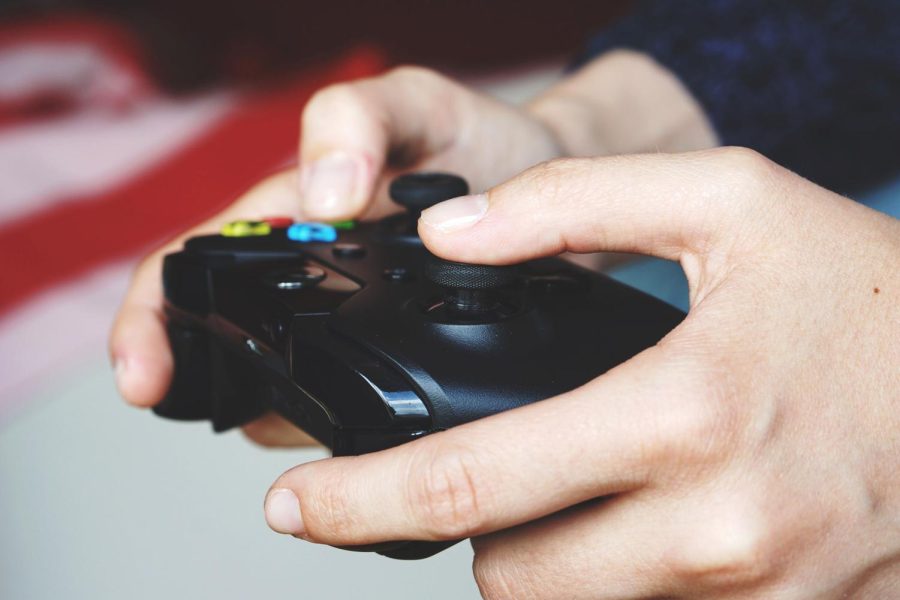Experts discuss gender, the body in esports
A player holds an Xbox controller.
February 11, 2022
In Keung Yoon ‘Becky’ Bae’s experience, simply introducing yourself as a woman in online gaming spaces is enough to send male teammates in a tirade. She said she can often pinpoint the minute when people will “lose their minds” after she speaks in a female voice.
“As a woman, if you enter the voice chat, you immediately reveal yourself as a woman in this virtual space, where you’re supposed to play without any consideration of race or gender,” she said. “The minute you speak, you put your gender out there.”
Bae, an assistant professor of Korean studies at the Georgia Institute of Technology’s School of Modern Languages, discussed the politics of bodies and gender in esports via Zoom on Wednesday as part of the Asia Pop speaker series hosted by Pitt’s Asian Studies Center. Esports are competitive multiplayer video games typically played by professional gamers for an audience. They have become a popular form of entertainment in East Asia over the past decade.
Bae began her lecture by describing the cultural importance of esports in South Korea. She explained that personal computer cafés are an important component of the history of South Korean gaming because they offered accessible and affordable social gaming spaces starting in the 1990s. Bae said gaming might not be as detached from the physical world as it initially seems.
“We think of it as disembodied, an avatar on a screen, solitary — just you and your controller. But I think you probably know that gaming is incredibly social, gaming is probably the most fun when you’re playing with friends, and gaming has a lot to do with the human body,” Bae said. “We need to center the human body when we think and talk about gaming.”
Bae said esports seems like a level playing ground for everyone, but it’s plagued by hidden inequities. The reason, she said, comes back to physicality — the presence of the human body, and the social, financial and technological circumstances surrounding it.
“The meritocratic promise of esports is that no matter where you’re from, no matter who you are, as long as you’re good enough, as long as you’ve got the skill, as long as you’re willing to grind, you can get here,” Bae said. “But it skips over various technological and financial considerations that totally blow up that argument.”
Bae also showed photos of several teams in the 2017 League of Legends world championship. The teams represented locations across the globe, from Vietnam to Vancouver, but their members had something in common — they were disproportionately Korean, regardless of their team’s geography.
“Why are [Koreans] so good?” Bae said. “It comes back to the PC cafés.”
Among the League of Legends elites that Bae showed, there was another commonality — every one was male. She discussed esports’ rampant gender inequality, undermining its “meritocratic promise.” Bae said the nature of esports training in South Korea, where gamers often live together, puts women at a disadvantage.
“In a culturally conservative country like Korea, it is very difficult for women to live in a house full of men,” she said. “It might not be desirable for the women themselves, and it might not be desirable for the men already living in the house.”
Lynn Kawaratani, the assistant director for partnerships and programming at the Asian Studies Center, said the Center created Asia Pop to encourage students’ relationships with pop culture.
“It serves as a sort of a gateway into Asian studies, meeting people at the place of interest and leading them into a deeper exploration of the field,” she said. “It also covers new and evolving areas of research as popular culture is such a dynamic topic.”
Seung-hwan Shin, a lecturer in East Asian languages and literature, said he was excited for Bae’s lecture and the rest of Asia Pop because of the cultural impact the topic has on the world.
“We are very much looking forward to the lecture this Wednesday, as well as other upcoming lectures,” Shin said. “The Asia Pop lecture series has been intended to help students enrich their understanding of the recent changes in Asian popular cultures and their legacies in the development of global culture today.”
Shin said he recognized the importance of studying esports as a cultural phenomenon.
“Online gaming has grown rapidly in the world over the past decade,” Shin said. “Online gaming is now often considered one of the most compelling examples of what people call metaverse. Especially for young generations, online gaming is a common part of their social and cultural practices today.”
Shin added that he hoped this lecture gave students the opportunity to reflect on their own gaming experiences.
“We hope that our online game lecture series serves as a valuable learning opportunity for our students and provides them with an opportunity of a serious reflection on their own everyday engagement with online gaming, in conjunction with the larger context of new technological and cultural developments in our contemporary society,” Shin said.








